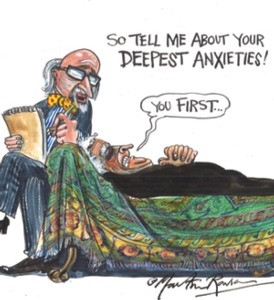
This article is a preview from the Spring 2020 edition of New Humanist
You're Not Listening: What You're Missing and Why It Matters (Harvill Secker) by Kate Murphy
There’s a photo of me taken in a smoky taverna in Athens, my head cocked to one side as I strain to follow the conversation. I’m raising my left ear. It’s only on reading You’re Not Listening that I discover there’s a left-ear advantage when it comes to interpreting emotional speech. It’s the kind of intuitive listening needed in a different culture or an unfamiliar place.
To truly listen is an art. Kate Murphy asks her readers the uncomfortable question of when they last actually practised it. “To really listen,” Murphy writes, “is to be moved physically, chemically, emotionally and intellectually by another person’s narrative.” When we “get” what another person is saying, “our brain waves are literally in sync.” Conversely, when we’re faced with opposing views, the same parts of the brain light up as if we were being chased by a bear. Far from an over-reaction, humans are biologically wired into “fight, flight or freeze mode” when our beliefs are threatened. Listening requires curiosity. It also requires courage.
Murphy is a journalist. She sees herself as a professional listener and was prompted to write her first book after noticing how many of her interviewees seemed starved for genuine attention, how they opened up to her, “sharing such tender things – unsolicited by me and wholly unrelated to the story that I’m writing.”
The loneliness epidemic, in Murphy’s native US and here in Britain, is increasingly recognised as a serious threat to public health. According to a 2018 survey, more than two in 10 adults in Britain say they always or often feel lonely. The key factor isn’t physical isolation but a profound sense of disconnect.
So how can we regain this lost art? Malcom Gladwell’s recent book Talking to Strangers offered insight into avoiding the kinds of misreadings we make on dealing with people we don’t know. You’re Not Listening shows this is only the start. In a chapter titled “I know what you’re going to say” Murphy explores the “closeness communication bias”, the terrifying phenomenon that explains why our spouse or best friend may be less likely to understand us than the average bloke in the street. The need to avoid assumptions, it seems, starts at home.
Murphy turns, for advice, to other listeners-by-trade. These are illuminating profiles, but some of the “teachable moments” can feel a bit strained. It is certainly intriguing that the CIA’s former chief interrogator got a prominent Pakistani nuclear scientist to admit he had met with Osama bin Laden through a meandering discussion on race, including his own African-American experience. But does this apply to a dinner party? Isn’t it enough to say that rapid-fire questions make people defensive and it’s much better to seek common ground? Equally, we don’t need a focus group guru to know that it’s exhausting to be constantly receptive – “You’re like a bowl of chocolate mousse and everybody’s got a spoon.”
The drawback of focusing on people whose profession involves listening to others is precisely that: it’s their job. You’re Not Listening ends with the assertion that, far from “talking’s meek counterpart”, listening is “actually the more powerful position”. Maybe that is true for a journalist or a spook. But as the chased-by-a-bear metaphor suggests, the listener is often in a vulnerable position, or at best a passive one. Being the “bowl of chocolate mousse” is often thankless emotional labour generally expected of women. After stating that almost all of her interviewees believed women were better listeners, Murphy frustratingly fails to follow up.
Still, the book is a timely intervention. In post-Brexit “divided Britain”, as in President Trump’s United States, listening feels like a radical and necessary act. After the divisive December election, we were treated to a chorus of advice in the media on how to best avoid talking to each other over Christmas, from playing “neutral” board games to limiting the booze. A BBC piece suggested the phrase: “I feel very differently about this to you, but it doesn’t mean I like you or love you any less . . .”
We’re being presented with a false choice: confrontation or disengagement. You’re Not Listening reminds us of the riskier, more rewarding route, of opening our ears and souls to the roaming, rambling joys of exchange.
Since returning from Greece to London, I’ve spent less time around big tables, content to absorb and not intervene. But heading into 2020, I’m not the first person to remark that my putative home country can seem at times like a foreign land. After reading You’re Not Listening, I’ll be making an effort to raise my left ear.

